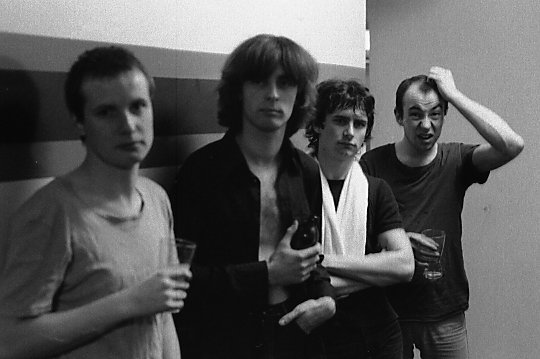
XTC
XTC were an English rock band formed in Swindon in 1972. Fronted by songwriters Andy Partridge (vocals, guitars) and Colin Moulding (vocals, bass), the band gained popularity during the rise of punk and new wave in the 1970s, later playing in a variety of styles that ranged from angular guitar riffs to elaborately arranged pop. Partly because the group did not fit into contemporary trends, they achieved only sporadic commercial success in the UK and US, but attracted a considerable cult following. They have since been recognised for their influence on post-punk, Britpop and later power pop acts.
This article is about the band. For the drug, see MDMA. For other uses, see XTC (disambiguation).
XTC
- Star Park (1972–1974)
- The Helium Kidz (1974–1975)
1972–2006
Partridge and Moulding first met in the early 1970s and subsequently formed a glam outfit with drummer Terry Chambers. The band's name and line-up changed frequently, and it was not until 1975 that the band was known as XTC. In 1977, the group debuted on Virgin Records and were subsequently noted for their energetic live performances and their refusal to play conventional punk rock, instead synthesising influences from ska, 1960s pop, dub music and avant-garde. The single "Making Plans for Nigel" (1979) marked their commercial breakthrough and heralded the reverberating drum sound associated with 1980s popular music.
Between 1979 and 1992, XTC had a total of 10 albums and 6 singles that reached the UK top 40, including "Sgt. Rock (Is Going to Help Me)" (1980) and "Senses Working Overtime" (1982). After 1982's English Settlement, the band stopped concert touring and became a studio-based project centred on Partridge, Moulding and guitarist Dave Gregory. A spin-off group, the Dukes of Stratosphear, was invented as a one-off excursion into 1960s-style psychedelia, but as XTC's music evolved, the distinctions between the two bands lessened. XTC continued to produce more progressive records, including the albums Skylarking (1986), Oranges & Lemons (1989) and Nonsuch (1992). In the US, "Mayor of Simpleton" (1989) was their highest-charting single, while "Dear God" (1986) was controversial for its anti-religious message.
Due to poor management, XTC never received a share of profits from record sales (of which there were millions), nor from touring revenue, forcing them into debt throughout the 1980s and 1990s. In 1993, they went on strike against Virgin, citing an unfair recording contract, and soon extricated themselves from the label. Gregory left the band during the making of Apple Venus Volume 1 (1999), after which the XTC name was used by the duo of Partridge and Moulding. In 2006, Partridge announced that his creative partnership with Moulding had disintegrated, leaving XTC "in the past tense". Moulding and Chambers briefly reunited as the duo TC&I in the late 2010s. Partridge and Gregory remain musically active.
1993–present: legal entanglement, return and breakup[edit]
Strike period[edit]
In 1993, Partridge conceived XTC's next project to be an album of bubblegum pop songs disguising itself as a retrospective compilation featuring 12 different groups from the early 1970s. The lyrics were also heavily sexual, with song titles such as "Lolly (Suck It and See)" and "Visit to the Doctor". Partridge recalled playing some demos for Virgin agents, and compared their reaction to the "Springtime for Hitler" scene from the 1967 film The Producers. The label rejected his idea.[32] Virgin denied Partridge's requests to renegotiate or revoke XTC's contract.[14] Paul Kinder believed that the label and the group were "poles apart" and that "the contract was so old it got to the point where Andy wanted the moon and Virgin weren't prepared to give it him."[14]
Whatever new music the band recorded would have been automatically owned by Virgin, and so the band enacted strike action against the label.[32] Prince and George Michael also went on a strike against their respective labels that was heavily publicized at about the same time. XTC's strike, however, received little press.[57][104] In the meantime, Partridge produced Martin Newell's 1993 album The Greatest Living Englishman[105] and early sessions for Blur's second album. "I thought I did sterling work. ... Next day, [David Balfe from the Teardrop Explodes said], 'Quite frankly, Andy, this is shit.'"[14] Other complications arose; he developed some health issues, and his wife divorced him.[14]
In 1997 (also reported as in late 1994[106]), XTC found themselves freed from financial debt and from Virgin after "making some heavy concessions". Partridge fantasised that people from the label "met in the dark and thought, 'These blokes are not making a living. We've had 'em all these years and we've got their catalogue and the copyright to their songs for evermore and we've stitched 'em up real good with a rotten deal so, erm, maybe we should let them go.' I like to think that it was a guilt thing."[14] One of the group's first new recordings since the strike was released for the tribute album A Testimonial Dinner: The Songs of XTC (1995).[107] "The Good Things", a Moulding song originally demoed for Oranges & Lemons,[12] was credited under the pseudonym Terry and the Lovemen.[107] In 1998, Song Stories, an authorized overview of the band's catalog by journalist and longtime friend Neville Farmer was published. Partridge said the book was badly edited and "used the crappiest quotes".[32]
Studio albums
See also
Documentary films
Music videos
The band were not allowed creative input for their music videos, except for "The Mole from the Ministry".[54]